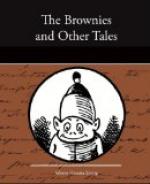It had never struck her before that a dirty salmon went well with brick-red. “They blend so becomingly, my dear,” she murmured; “and I think the under-skirt will sit well, it is so stiff.”
The widow did not reply. The fumes of the tutor’s compound made her sleepy, and though she nodded to Miss Letitia’s observations, it was less from appreciation of their force, than from inability to hold up her head. She was dreaming uneasy, horrible dreams, like nightmares; in which from time to time there mingled expressions of doubt and dissatisfaction which fell from Miss Letitia’s lips. “Just half-a-yard short—no gores—false hem,” (and the melancholy reflection that) “flounces take so much stuff.” Then the tutor’s face kept appearing and vanishing with horrible grimaces through the mist. At last the widow fell fairly asleep, and dreamed that she was married to the Blue Beard of nursery annals, and that on his return from his memorable journey he had caught her in the act of displaying the mysterious cupboard to Miss Letitia. As he waved his scimitar over her head, he seemed unaccountably to assume the form and features of the tutor. In her agitation the poor woman could think of no plea against his severity, except that the cupboard was already crammed with the corpses of his previous wives, and there was no room for her. She was pleading this argument when Miss Letitia’s voice broke in upon her dream with decisive accent:
“There’s enough for two bodies.”
The widow shrieked and awoke.
“High and low,” explained Miss Letitia. “My dear, what are you screaming about?”
“I am very sorry indeed,” said the widow; “I beg your pardon, I’m sure, a thousand times. But since Mr. Jones’s death I have been so nervous, and I had such a horrible dream. And, oh dear! oh dear!” she added, “what is the matter with my precious child? Macready, love, come to your mamma, my pretty lamb.”
Ugh! ugh! There were groans from the corner where Master MacGreedy sat on his crackers as if they were eggs, and he hatching them. He had only touched one, as yet, of the stock he had secured. He had picked it to pieces, had avoided the snap, and had found a large comfit like an egg with a rough shell inside. Every one knows that the goodies in crackers are not of a very superior quality. There is a large amount of white lead in the outside thinly disguised by a shabby flavour of sugar. But that outside once disposed of, there lies an almond at the core. Now an almond is a very delicious thing in itself, and doubly nice when it takes the taste of white paint and chalk out of one’s mouth. But in spite of all the white lead and sugar and chalk through which he had sucked his way, MacGreedy could not come to the almond. A dozen times had he been on the point of spitting out the delusive sweetmeat; but just as he thought of it he was sure to feel a bit of hard rough edge, and thinking he had gained the kernel at last, he held valiantly on. It only proved to be a rough bit of sugar, however, and still the interminable coating melted copiously in his mouth; and still the clean, fragrant almond evaded his hopes. At last with a groan he spat the seemingly undiminished bonbon on to the floor, and turned as white and trembling as an arrowroot blanc-mange.




